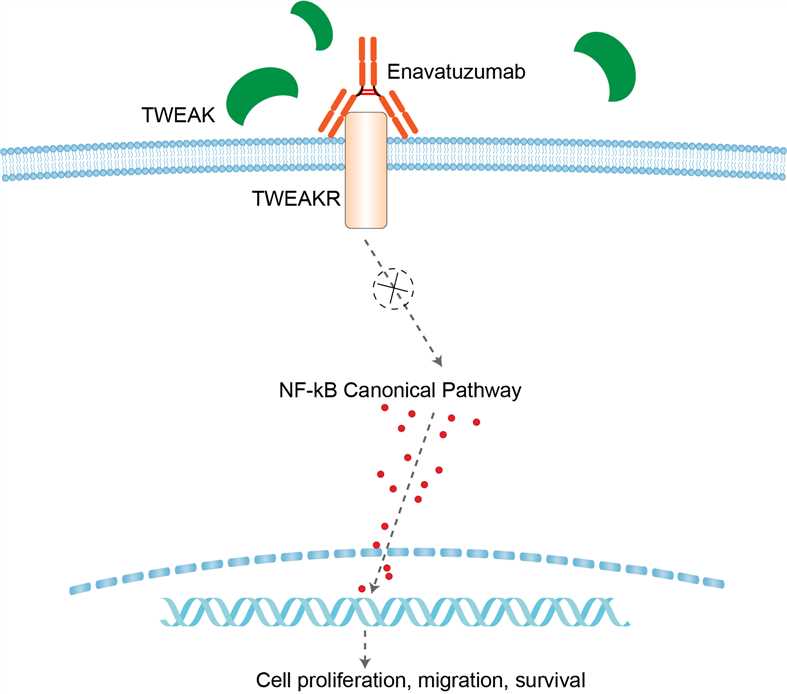Enavatuzumab Overview
Introduction of Enavatuzumab
Enavatuzumab (also called PDL192) is a humanized IgG1 - kappa monoclonal antibody directed against the tumor necrosis factor-like weak inducer of apoptosis receptor (TWEAKR) with potential antineoplastic, immunomodulating and antiangiogenic activities. It is a moderate agonist of TweakR that was evaluated in a phase I clinical study for the treatment of solid malignancies. Enavatuzumab and its murine parental antibody, exert some of the biological functions of TWEAK by binding to TweakR. In some xenograft models, antibody-dependent cell-mediated cytotoxicity (ADCC) appears to play a major role in the antitumor activity, whereas in other models, the direct signaling function of enavatuzumab appears to dominate. In preclinical toxicity studies in cynomolgus monkeys, administration of enavatuzumab at doses up to 100 mg/kg was generally well tolerated. The toxicity observed was generally reversible and observed at the high range of doses tested, with the primary targets of toxicity being the kidney (tubular degeneration/regeneration), liver (bile duct hyperplasia), and pancreas (fibrotic replacement of acini, mononuclear cell infiltration, decreased zymogen granules in acinar cells).
Mechanism of Action of Enavatuzumab
TNF-like weak inducer of apoptosis (TWEAK, aka TNFSF12, APO3L, or CD255) and its receptor TweakR (Fn14, TNFRSF12A, CD266) are members of the TNF and TNF receptor superfamilies, respectively. TWEAK is a multifunctional cytokine that affects cell proliferation, migration and survival, cytokine induction, cytotoxicity, and apoptosis. In situations of acute injury, TWEAK and TweakR normally interact to coordinate inflammatory and progenitor cell responses in order to facilitate acute tissue repair. However, in chronic inflammatory disease, this ligand–receptor pair is persistently activated and pathologically amplifies inflammation and promotes tissue damage. TweakR is overexpressed in numerous cancers, including melanoma, breast, brain, non–small cell lung, pancreas, esophageal, colorectal, renal, ovarian, and prostate cancers. The protumorigenic effects of TWEAK are postulated to occur via multiple mechanisms: protecting cancer cells from apoptosis by inducing Bcl-2, promoting migration and invasion, inducing cell proliferation, promoting angiogenesis of tumor vasculature, and repressing tumor surveillance. TWEAK also has anticancer properties, including the induction of apoptosis and/or growth inhibition of cancer cells through activation of the noncanonical NF-κB pathway, which underscores the pleiotropic nature of this signaling pathway. Although TWEAK has pleiotropic functions, it was initially identified as a weak inducer of apoptosis. Additional studies further indicated that TWEAK can induce multiple cancer cell lines to undergo caspase-dependent apoptosis, and cell death can be further enhanced when combined with TNF-α or IFN-γ treatment. Enavatuzumab is a humanized IgG1 monoclonal antibody targeting the receptor of TWEAK. It binds to TWEAKR and inhibits TWEAK ligand binding and activation of NF-kappaB-mediated cytokine release, which may result in tumor cell apoptosis. The antitumor activity of enavatuzumab has been attributed to three distinct mechanisms of action: (1) direct killing of tumor cells by inducing caspase-3/7 activation, (2) growth inhibition of tumor cell lines through p21-mediated cell cycle arrest, and (3) via antibody dependent cell-mediated cytotoxicity (ADCC). Namely, some preclinical studies demonstrate that enavatuzumab can exert its potent antitumor activity by actively recruiting and activating myeloid effectors to kill tumor cells.

Fig 1. Mechanism of Action of Enavatuzumab
For research use only. Not intended for any clinical use.
This site is protected by reCAPTCHA and the Google Privacy Policy and Terms of Service apply.



